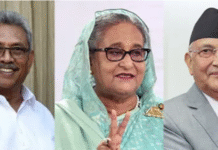Bangladesh Chronicle
December 10, 2013
There were numerous criminals who perpetrated unjustifiable harm in the name of religion during the war for independence in 1971. While most people believe the death sentences to these war criminals are justified if proven guilty. Unfortunately for the case of Molla and others, the justice became a showpiece. It was targeted to break up BNP coalition with Jamaat.
From BNP’s point of view if Jamaat leaves their coalition, it will seek to play with Awami League as it has done in the past. Creating havoc with Jamaat gives AL an upper hand in the one coalition election to be held in January 2014..
While most Bangladeshis want the war criminals to get appropriate justice, they will not accept the concoction cooked by AL prosecutors as well as certain judges.
Human Rights Watch has supported and continues to support efforts to hold perpetrators responsible for the terrible crimes of the 1971 conflict that led to Bangladesh’s independence. The tribunal that has been created to hear those cases, however, has been marred by serious deficiencies which have undermined the integrity of its process and the soundness of the tribunal’s judgments—which have included, in eight cases, the death penalty. The tribunal’s judgments have profound impact on Bangladesh’s political scene, which is why observers have offered their constructive criticisms of the process—criticisms which have not been accepted.
The United States and other governments have stated their concerns. Secretary of State Kerry raised all of these issues in a letter to Sheikh Hasina and the leader of the opposition, Khaleda Zia, earlier this year.
“Human Rights Watch has criticized the tribunal, saying it is marred by ‘a strong judicial bias toward the prosecution.’ Opposition forces have dismissed the tribunal as politically motivated. Jamaat-e-Islami, an Islamist opposition party allied with the Bangladeshi Nationalist Party, has been barred by a Supreme Court ruling from participating in the January elections.”
The row that was kicked up by the leakage of the judgment ahead of its pronouncement in court, the terrorist scare real or imagined, growing signs of public disenchantment with the present government and possible debacle for the ruling party electorally or otherwise in the transition of power due within months, and sharp rebuke by the judicial establishment of the country led by the Vice-Chairman of the Bar Council delivered to “those associated” with the mistrial and evident perversion of the course of justice appears to have had a moderating effect on the Tribunal.
In its latest judgment against another senior opposition leader, former parliamentarian and minister Abdul Alim, for war crimes found proven by the Tribunal on October 9, the judges coined a new phrase “imprisonment till death” to replace life-sentence in their verdict. Presumably this was to appease the lynching crowd let loose by the ruling party, against all accused implicated in war crimes, with the smell of death in captivity of the convicted old man, but stopping short of actual death sentences for which the Tribunal has been much criticized at home and abroad. But the stigma that has been attached to the Tribunal for “faulty” proceedings and “biased” judgment will hardly be erased by such semantics.










